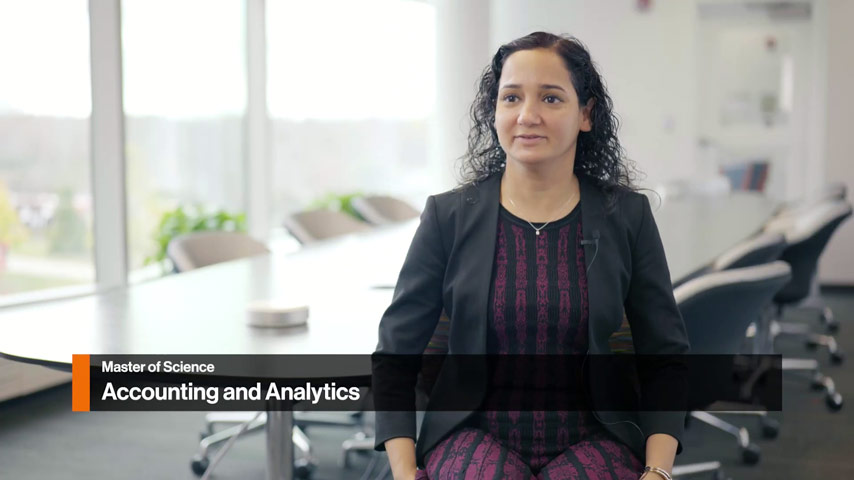Accounting and Analytics Master of Science Degree

Accounting and Analytics
Master of Science Degree
- RIT /
- Saunders College of Business /
- Academics /
- Accounting and Analytics MS
RIT’s master’s in accounting analytics leads to advanced accounting careers through the application of analytical tools and skills.
$75K
Median First-Year Salary of RIT Graduates from this degree
Overview for Accounting and Analytics MS
Why Study Accounting Analytics at RIT
STEM-OPT Visa Eligible: The STEM Optional Practical Training (OPT) program allows full-time, on-campus international students on an F-1 student visa to stay and work in the U.S. for up to three years after graduation.
Solid foundation in accounting, auditing, and tax.
Analytical skills consistent with emerging technology-oriented jobs in accounting
Hands-on experience with R and Python and with data visualization software such as Tableau
An understanding of Structured Query Language (SQL) and Systems Application and Products in Data Processing (SAP).
Combine vital areas of technology, Big Data, AI and advanced analytics
Accounting has become data-driven and technology-infused. A master’s in accounting analytics can help you compile and use data as well as develop a familiarity with analyzing this information to gain significant insights, predict future outcomes, or even ascertain risk. As a result, the market demands accounting analytics graduates with a variety of data-related skills and an understanding of how technology can be used to further an organization’s mission. RIT’s master’s in accounting analytics balances this modern need with traditional accounting preparation.
RIT’s Accounting Master’s
In RIT’s master’s in accounting analytics pulls together key areas of technology, finance, strategy, analytics, data modeling, and more to help you advance your accounting career.
In our innovative curriculum, you will dive into the technology and data analytics for accounting, with a specific focus on:
- Developing traditional accounting acumen.
- Understanding various ways in which accounting and business data is accessed and used.
- Usage of current industry tools in areas such as data access, data insights, and data visualization.
Accounting Analytics Career Advancement with Hands-on Learning
RIT’s accounting MS students gain insights and career advantages through:
- Guidance through CPA examination and licensure process.
- Conducting research including traditional accounting topics plus technology such as text mining and analysis of accounting reports, and uses of blockchain in accounting, with professors published in the top academic journals.
- Networking opportunities through events like the Accounting Banquet and classroom visits.
- A dedicated career fair for accounting students, in addition to RIT-wide career fairs.
- Next Generation of Accounting club enhancing your studies with activities outside the classroom. The club provides opportunities to network with accounting professionals and employers and learn about the various career paths that the accounting field has to offer.
 Play video: Accounting and Analytics MS at RIT Saunders College, with professor Archana Jain
Play video: Accounting and Analytics MS at RIT Saunders College, with professor Archana Jain
Program Director Archana Jain discusses the Accounting and Analytics program
-
Affordable Now. Valuable for Life.
Earn your master’s degree without the full price tag. With Master Up you can receive a 30% tuition scholarship for an RIT master’s degree.
-
Join us for Fall 2025
Many programs accept applications on a rolling, space-available basis.
Careers and Experiential Learning
Typical Job Titles
| Accounts payable specialist | Accounts receivable specialist | Assistant controller |
| Budget analyst | Certified Public Accountant (CPA) | Chief Executive Officer (CEO) |
| Chief Financial Officer (CFO) | Compliance Officer | Controller |
| FBI Investigator | Financial Analyst | Forensic Accountant |
| Internal Auditor (CIA) | Junior accountant | Litigation Consultant |
| Management Accountant | Payroll administrator | Tax consultant |
| Treasurer |
Cooperative Education and Internships
What makes an RIT education exceptional? It’s the ability to complete relevant, hands-on career experience. At the graduate level, and paired with an advanced degree, cooperative education and internships give you the unparalleled credentials that truly set you apart. Learn more about graduate co-op and how it provides you with the career experience employers look for in their next top hires.
Co-ops and internships take your knowledge and turn it into know-how. Business co-ops provide hands-on experience that enables you to apply your knowledge of business, management, finance, accounting, and related fields in professional settings. You'll make valuable connections between course work and real-world applications as you build a network of professional contacts.
Students in the accounting and analytics MS are encouraged to participate in at least one cooperative education or internship experience.
Accounting and Analytics Careers
Graduates of RIT's master’s in accounting and analytics are prepared for outstanding career opportunities in a range of accounting positions. Our alumni are employed at diverse firms such as Bonadio Group, BluEnt, Freed Maxick CPAs, Mengel Metzger Barr & Co., PricewaterhouseCoopers (PwC), and more. Our Accounting Advisory Board helps students prepare for their careers by ensuring the curriculum is continuously updated to meet employers needs while providing networking and mentorship opportunities.
Featured Work and Profiles
-
Elba Technologies, Germany
Dafine Arifi ’18 "The education I have received here at RIT and Saunders College of Business, I believe, is truly world-class."
Read More about Elba Technologies, Germany -
The Bonadio Group, Pittsford, New York
Linda Ochieng ’23 "The quality of academic programs offered at Saunders is excellent. For example, as an accounting student, I have seen some tremendous changes that have helped me prepare to start my career,...
Read More about The Bonadio Group, Pittsford, New York -
Research Insights: Board Reforms Improve Financial Reporting
Rong Yang Bringing higher audit fees and increased transparency
Read More about Research Insights: Board Reforms Improve Financial Reporting -
Research Insights: The Interplay of Sustainability and Accounting
Manlu Liu, Jing Tang The dynamics between auditors' sustainability focus and their clients' reporting activities
Read More about Research Insights: The Interplay of Sustainability and Accounting -
Research Insights: Cognitive Dissonance in investor decision-making
Zhijian Huang Good news, bad news: How cognitive dissonance plays a role in investor decision-making
Read More about Research Insights: Cognitive Dissonance in investor decision-making -
Research Insights: To pay or not to pay?
Chun Keung Hoi The reputational effects of tax avoidance strategies
Read More about Research Insights: To pay or not to pay?
Curriculum for 2024-2025 for Accounting and Analytics MS
Current Students: See Curriculum Requirements
Accounting and Analytics, MS degree, typical course sequence
| Course | Sem. Cr. Hrs. | |
|---|---|---|
| First Year | ||
| ACCT-710 | Tax Analysis and Strategy |
3 |
A continuation of Basic Taxation. Emphasis is on taxation of business entities, as well as estate and gift taxation and planning. Students use technology to prepare complex returns and to research tax issues. Tax analysis and planning are integrated throughout. Lecture 3 (Fall). | ||
| ACCT-738 | Information Systems Auditing and Assurance Services |
3 |
An examination of the unique risks, controls, and assurance services resulting from and related to auditing financial information systems with an emphasis on enterprise resource systems. (Prerequisites: ACCT-705 or equivalent course.) Lecture 3 (Spring). | ||
| ACCT-740 | Comparative Financial Statement Analysis |
3 |
This course is designed to prepare students to interpret and analyze financial statements effectively. Explores in greater depth some of the financial reporting topics introduced in the core accounting course and includes a discussion of International Financial Reporting Standards. (Prerequisites: ACCT-603 or equivalent course.) Lecture 3 (Fall). | ||
| ACCT-745 | Accounting Information and Analytics |
3 |
The objective for this course is helping students develop a data mindset which prepare them to interact with data scientists from an accountant perspective. This course enables students to develop analytics skills to conduct descriptive, diagnostic, predictive, and prescriptive analysis for accounting information. This course focuses on such topics as data modeling, relational databases, blockchain, visualization, unstructured data, web scraping, and data extraction. (Prerequisites: ACCT-110 or ACCT-603 or equivalent course.) Lecture 3 (Fall, Summer). | ||
| ACCT-796 | Accounting Capstone Experience |
3 |
The principal focus of this course is students completing several projects provided by members of CPA firms and industry employers. Employers provide assignments, which may include data or require students to gather relevant data, and students use defined technology, which may include a variety of applications common in technological accounting practice, to complete projects in teams. Students also write comprehensive individual reports and analyses related to the projects. Peripheral work in the course includes examination of theoretical concepts, definitions, and models espoused in the accounting literature and relevant to analyzing various contemporary issues in financial accounting and reporting. The historical development of accounting standards and contemporary issues in financial reporting are integrated. The course requires writing and student presentations. Subject to approval by the Program Director, an individual student internship/coop followed by an in-depth report may obtain equivalent credit. Lecture 3 (Spring). | ||
| FINC-780 | Financial Analytics |
3 |
This course provides a survey of financial analytics applications in contexts such as investment analysis, portfolio construction, risk management, and security valuation. Students are introduced to financial models used in these applications and their implementation using popular languages such as R, Matlab, and Python, and packages such as Quantlib. A variety of data sources are used: financial websites such as www.finance.yahoo.com, government sites such as www.sec.gov, finance research databases such as WRDS, and especially Bloomberg terminals. Students will complete projects using real-world data and make effective use of visualization methods in reporting results. There are no pre or co-requisites; however, instructor permission is required – student aptitude for quantitative work will be assessed; waived for students enrolled in quantitative programs such as the MS-Computational Finance which have pre-requisites in the areas of calculus, linear algebra, and programming. Lecture 3 (Fall). | ||
| MGIS-650 | Introduction to Data Analytics and Business Intelligence |
3 |
This course serves as an introduction to data analysis including both descriptive and inferential statistical techniques. Contemporary data analytics and business intelligence tools will be explored through realistic problem assignments. Lecture 3 (Fall). | ||
MGIS Elective |
3 | |
Graduate Electives |
6 | |
| Total Semester Credit Hours | 30 |
|
Admissions and Financial Aid
This program is available on-campus only.
| Offered | Admit Term(s) | Application Deadline | STEM Designated |
|---|---|---|---|
| Full‑time | Fall or Spring | Rolling | Yes |
| Part‑time | Fall or Spring | Rolling | No |
Full-time study is 9+ semester credit hours. Part-time study is 1‑8 semester credit hours. International students requiring a visa to study at the RIT Rochester campus must study full‑time.
Application Details
To be considered for admission to the Accounting and Analytics MS program, candidates must fulfill the following requirements:
- Complete an online graduate application.
- Submit copies of official transcript(s) (in English) of all previously completed undergraduate and graduate course work, including any transfer credit earned.
- Hold a baccalaureate degree (or US equivalent) from an accredited university or college. A minimum cumulative GPA of 3.0 (or equivalent) is recommended.
- Submit a current resume or curriculum vitae.
- Submit a personal statement of educational objectives.
- Letters of recommendation are optional.
- Entrance exam requirements: GRE or GMAT required for individuals with degrees from international universities. No minimum score requirement.
- Submit English language test scores (TOEFL, IELTS, PTE Academic), if required. Details are below.
English Language Test Scores
International applicants whose native language is not English must submit one of the following official English language test scores. Some international applicants may be considered for an English test requirement waiver.
| TOEFL | IELTS | PTE Academic |
|---|---|---|
| 88 | 6.5 | 60 |
International students below the minimum requirement may be considered for conditional admission. Deaf and hard-of-hearing test takers with significant hearing loss do not need to take the listening and speaking sections for the TOEFL and IELTS. Each program requires balanced sub-scores when determining an applicant’s need for additional English language courses.
How to Apply Start or Manage Your Application
Cost and Financial Aid
An RIT graduate degree is an investment with lifelong returns. Graduate tuition varies by degree, the number of credits taken per semester, and delivery method. View the general cost of attendance or estimate the cost of your graduate degree.
A combination of sources can help fund your graduate degree. Learn how to fund your degree
Related News
-
August 7, 2024

Accounting and Analytics Catapults Graduates into Advanced Accounting Careers
The newly revised master of science in accounting and analytics from Saunders College of Business provides students with the tools to be leaders in managing internal and external data related to accounting information using cutting-edge accounting technologies such as AI, advanced analytics, Big Data, and financial analytics.
-
June 13, 2024

Saunders Graduate Programs Ranked by Eduniversal 2024
Saunders College of Business continues to be a leader in graduate programs nationally and internationally.
-
June 3, 2024

2023-24 Accomplishments from Saunders Students
If you are a student at Saunders College and have exciting news to share, email communications@saunders.rit.edu.
Contact
- Delaney Ball
- Assistant Director
- Office of Graduate and Part-Time Enrollment Services
- Enrollment Management
- 585‑475‑6933
- Delaney.Ball@rit.edu
- Matthew Cornwell
- Associate Director of Student Services
- Student Services
- Saunders College of Business
- 585‑475‑6916
- mcornwell@saunders.rit.edu
Saunders College of Business






















